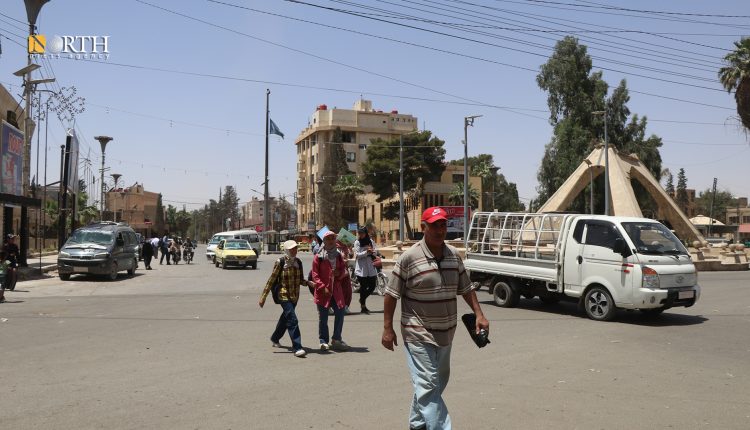By Dilsoz Youssef
HASAKAH, Syria (North Press) – Residents of Hasakah Governorate in northeastern Syria are hopeful that the recent lifting of U.S. and European sanctions will bring long-overdue investment, infrastructure development, and job opportunities after years of marginalization and war.
In one of the alleys of the market in Hasakah city, where street vendors line both sides of the road, Khaled Mohammed stands contemplating a future that could be fairer for his region after years of marginalization.
He hopes that the recent lifting of U.S. and European sanctions on Syria will serve as a genuine opportunity to stimulate investment in northeastern Syria.
U.S. President Donald Trump announced on May 13 the suspension of sanctions imposed on Syria, which was seen as a gesture toward giving the Syrian transitional government a new chance.
A week later, Europe followed suit by lifting sanctions entirely—a step described as potentially paving the way for economic stability in a country ravaged by more than 14 years of war.
Destroyed infrastructure
Mohammed, who was displaced from the countryside of Sere Kaniye (Ras al-Ain) following the Turkish invasion in late 2019, says that the eastern region has long been neglected by the former regime, particularly in the fields of education and public services, despite the fact that much of the country’s wealth in oil and agriculture is concentrated in the area.
He adds that the region lacked universities and proper infrastructure, and was treated as underdeveloped with no factories or industrial projects being established. “That’s why investment here is essential,” he says.
The 50-year-old man points out that European and U.S. sanctions further worsened the situation. “Now, with the lifting of sanctions and the end of the former regime, and as a new administration takes control in Damascus, we hope to see genuine reforms and improvements in the eastern region.”
Many Syrians hope that lifting sanctions will improve the dire economic conditions, amid growing calls to increase investment opportunities in the “Jazira region,” often referred to as the country’s “breadbasket.”
Mohammed Shawqi Mohammed, co-chair of the Economy and Agriculture Board of the Autonomous Administration of North and East Syria (AANES), stresses that “it is the responsibility of the Syrian transitional government to use the lifting of sanctions as a step toward achieving national security and stability.”
He adds that the government must involve all components of the country in rebuilding Syria and focus on improving public services and rehabilitating the destroyed infrastructure.
Lack of job opportunities
For his part, Jawhar al-Maslat, a graduate of the Institute of Music, says most of the young people in the region are unemployed or work in fields unrelated to their education due to years of marginalization.
Speaking in front of a stall selling women’s goods in the city market, he says, “We are hopeful that the lifting of sanctions across Syria will bring positive change. Hasakah is considered the economic backbone of the country and home to vital resources like oil, wheat, barley, and cotton. Unfortunately, there are no capable hands or systems in place to develop and utilize these resources.”
“Most of the youth here are jobless. I personally am a university graduate working at a small stall because we never had a fair shot at previous job competitions.”
He notes that many young people migrate to Damascus or Aleppo in search of work, even though the resources are already here. “But there are no factories, no infrastructure. We need cotton and wheat factories. We need real investment in the region instead of being treated like second-class citizens—as if we aren’t part of this country.”
Meanwhile, young man Ahmad Ayman expresses his frustration with the difficult situation, saying, “During the period of sanctions, our conditions were extremely poor. Now that the sanctions have been lifted, we are cautiously optimistic.”
“We hope for job opportunities and for the eastern region to benefit from this shift through the establishment of factories and a reduction in unemployment.”
He adds, “Many university graduates are working as laborers due to a lack of opportunities. We lack basic necessities like electricity and water, which are fundamental for any upcoming economic project.”
Despite the optimism among Hasakah’s residents in the post-sanctions phase, hopes remain tied to the possibility of turning promises into tangible actions, and for northeastern Syria to witness serious steps toward development and investment.
After years of neglect, the people of this region look forward to a future where local wealth is harnessed for their benefit, where job opportunities and services become available, and where Hasakah can be a genuine partner in building a new, fairer Syria for all its citizens.

